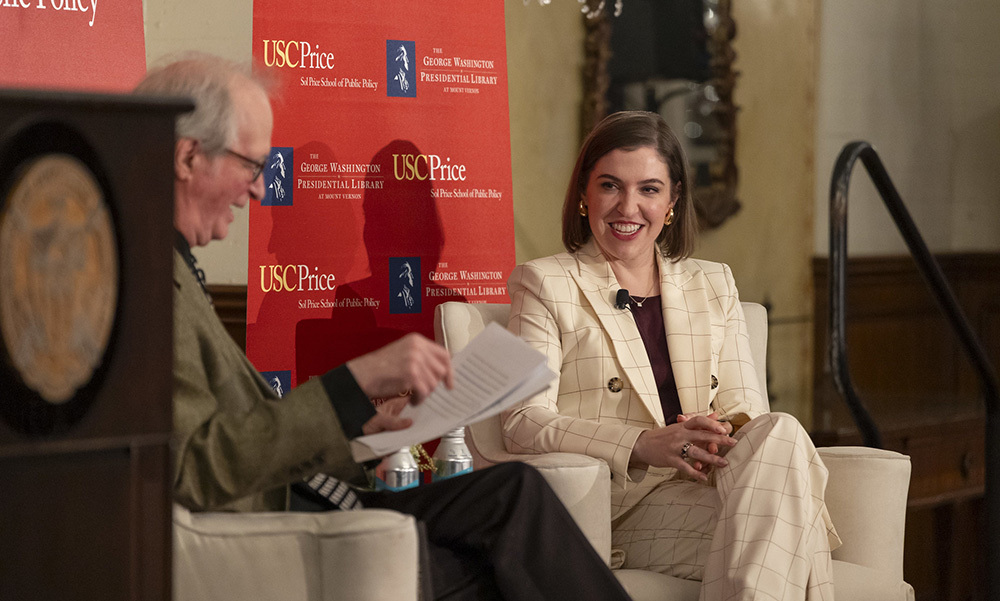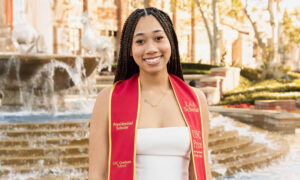Think of a decade in U.S. history characterized by pandemics, political violence, contested elections, foreign interference in voting, intense partisanship, interparty and intraparty fighting, and concerns about immigration and citizenship.
Sound like current times?
Indeed, says Lindsay Chervinsky, Ph.D., a presidential historian and Executive Director of the George Washington Presidential Library.
But these challenges also applied to the 1790s, when Washington served as the nation’s first president (1789 to 1797) while the new country grappled with establishing a stable government, navigating complex foreign relations, and developing a strong national identity, said Chervinsky, speaking at the most recent installment of the George Washington Leadership Lecture Series at USC.
Her topic was “Presidential Precedents: The Foundations of the Republic.”
Now in its 12th year, the semi-annual presentations are a partnership between the USC Price School of Public Policy and the George Washington Presidential Library.
In the spring, the talks are held at USC and in the fall at Washington’s estate at Mount Vernon in Fairfax County, Va.
Key legacy of John Adams
A key precedent established at that time more than 225 years ago was the peaceful transfer of presidential power from Washington’s successor, John Adams, to the nation’s third president, Thomas Jefferson, noted Chervinsky, author of the new book, “Making the Presidency: John Adams and the Precedents That Forged the Republic.”
Adams was confronted with intense partisan divides, debates over citizenship, fears of political violence, potential for foreign conflict with France and Britain, and a nation unsure that the presidency could even work without Washington at the helm.
Chervinsky’s book and portions of her discussion describe how Adams defended the presidency from his own often obstructionist cabinet, protected the nation from foreign attacks, and forged trust and dedication to election integrity and the peaceful transfer of power between parties, even though it cost him his political future.
The test came in the election of 1800, when Adams lost to Thomas Jefferson.
In those days, state electors, not the popular vote, determined the outcome, with each elector casting votes for two candidates, including those for vice president. Thomas Jefferson and his running-mate, Aaron Burr, tied for the top job. As such, the outcome had to be determined by the House of Representatives, which elected Jefferson on the 36th ballot.
“The Constitution says if there is a tie or a candidate does not get above a certain threshold, then the election goes to the House of Representatives — this also happened in 1824 and in 1876,” Chervinsky explained.
Adams graciously stepped aside.
“And I think the most important precedent that Adams established is that we expect there to be a peaceful transfer of power, but the people involved set the tone and the character of what that transition will look like. And he set the example of, I think, what we want each transition to look like.”
Jan. 6, 2021
The Jan. 6, 2021 U.S. Capitol attack by supporters of defeated President Donald Trump flew in the face of this expectation, noted Professor David Sloane, Chair of the USC Price School’s Department of Urban Planning and Spatial Analysis, who hosts the lecture series.
“What was so important about the election of 1800 was that a couple of people made the decision to put the Constitution above their own political or partisan interests,” said Chervinsky, also author of “The Cabinet: George Washington and the Creation of the American Institution.”
“And so, I think, whenever we are having a moment of constitutional crisis, it requires citizens, even if they are not in positions of huge power, to recognize that the nation requires all of us to continue to choose to support and to fight for this thing that we are very lucky that we have survived for 250 years,” Chervinsky continued.
“But the future is never guaranteed, and it does require constant choice to adhere to that future and to the Constitution.”
The annual George Washington Leadership Lecture Series at Mount Vernon is sponsored by the USC Sol Price School of Public Policy and the Fred W. Smith National Library for the Study of George Washington.
The lecture series was established through a gift by Maribeth Borthwick (’73), vice regent for California of the Mount Vernon Ladies’ Association, the non-profit that preserves and maintains the Mount Vernon estate originally owned by Washington’s family.






